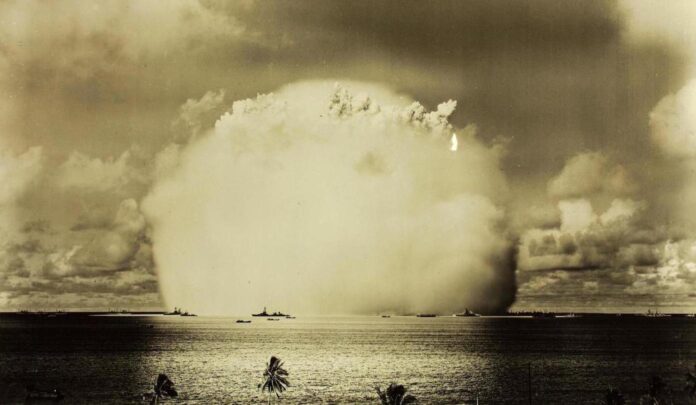The world public opinion goes on being absorbed by the gas war and the evolution of war operations in Ukraine, but we realize that the international diplomacy of the major planetary powers that has been held in New York at the end of August turned out to be a disaster.Years of negotiations and two summits passed, but the NPT (Nuclear Non-Proliferation Treaty) was neither renewed nor denounced. The major powers that “officially” hold nuclear arsenals – the US, Russia, China, Great Britain and France – didn’t intend to go on limiting their own weapons. On the contrary, they have openly declared that the research for the modernization of bombs would proceed more and more quickly.
The principles of 2010 have been totally ignored
The general principles established in 2010 was formally present in the program, but they have essentially been ignored. For example, the commitment not to be the first to use nuclear weapons in a possible conflict has been absolutely disregarded. Also, for the second time, no final common document was drafted. The simple threat of using atomic weapons, which has become more and more frequent in recent months, has not even been condemned. No mention was made of North Korea’s warlike intentions, of the looming conflict between China and India, and also of the Ukrainian nuclear power plants, whose safety has now reached an all-time low. In short, there are no circumstances to think about limitations of nuclear arsenals in the coming years.
Moscow increasingly isolated
The Kremlin leaders are aware that the European Union’s achievement of energy independence will take time, but it will eventually be achieved. That’s why they stir up the bugbear of Ukrainian nuclear power plants in an increasingly blackmailing manner. The decision to no longer grant entry visas to Russian citizens is the last blow that Moscow is about to suffer. The consequence is that Russia will be increasingly isolated from that part of the world that drives the technological development. The idea of containing the weapons is only a wish for a rather distant future. Meanwhile, missiles closer and closer fall on to nuclear power plants. The contemporary funeral of Gorbachev, in which Putin didn’t participate in, seem to symbolically put an end to that march towards nuclear peace that the late Kremlin leader had invoked.
_______________________________________________________________________________________________________
IL DE PROFUNDIS DELLA DENUCLEARIZZAZIONE DEL PIANETA
Stop al Trattato di Non Proliferazione nucleare
Mentre l’opinione pubblica mondiale concentrava la sua attenzione sulla guerra del gas e sull’evoluzione delle operazioni belliche in Ucraina, a New York si è consumato alla fine di agosto un gravissimo fallimento della diplomazia delle maggiori potenze planetarie. Dopo sette anni di trattative e due summit il TNP (Trattato di non proliferazione nucleare) non è stato né rinnovato né denunciato. Le maggiori potenze che «ufficialmente» detengono arsenali nucleari – Usa, Russia, Cina, Gran Bretagna e Francia – non hanno mostrato alcuna intenzione di procedere sulla strada della limitazione dei propri armamenti. Anzi hanno dichiarato apertamente che le ricerche per l’ammodernamento di tale tipo di ordigni procederà sempre più speditamente.
Ignorati i principi fissati nel 2010
I principi generali fissati nel 2010 non sono stati messi in discussione formalmente, ma nella sostanza sono stati ignorati. Ad esempio, non si è fatto cenno all’impegno di non usare per primi armi atomiche in un eventuale conflitto e – per la seconda volta consecutiva – non si è arrivati a stilare un documento comune finale. Non si è neanche condannata la semplice minaccia dell’uso di armi atomiche, sempre più frequente negli ultimi mesi. Non si è parlato delle intenzioni bellicose della Corea del Nord, del conflitto latente fra Cina e India e non si è affrontato il problema delle centrali nucleari ucraine, la cui sicurezza è ormai arrivata ai minimi storici. Insomma, non ci sono le circostanze per pensare a limitazioni di arsenali nucleari nei prossimi anni.
Mosca sempre più isolata
I leader del Cremlino sanno bene che la conquista dell’indipendenza energetica da parte dell’Unione Europea richiederà tempo, ma alla fine sarà realizzata. Per tale ragione agitano lo spauracchio delle centrali nucleari ucraine in maniera sempre più ricattatoria. La decisione di non concedere più visti di entrata a cittadini russi è l’ultima delle batoste che Mosca sta per subire, che la isola sempre di più da quella parte del mondo che guida lo sviluppo tecnologico. Aspettarsi passi avanti sul contenimento del nucleare può essere solo un augurio per un futuro piuttosto lontano. Nel frattempo, i missili piovono sempre più vicini alle centrali nucleari. I contemporanei funerali di Gorbacev, disertati da Putin, sembrano porre simbolicamente la parola fine a quella marcia verso la pace nucleare alla quale il defunto leader del Cremlino aveva tentato di dare inizio.








